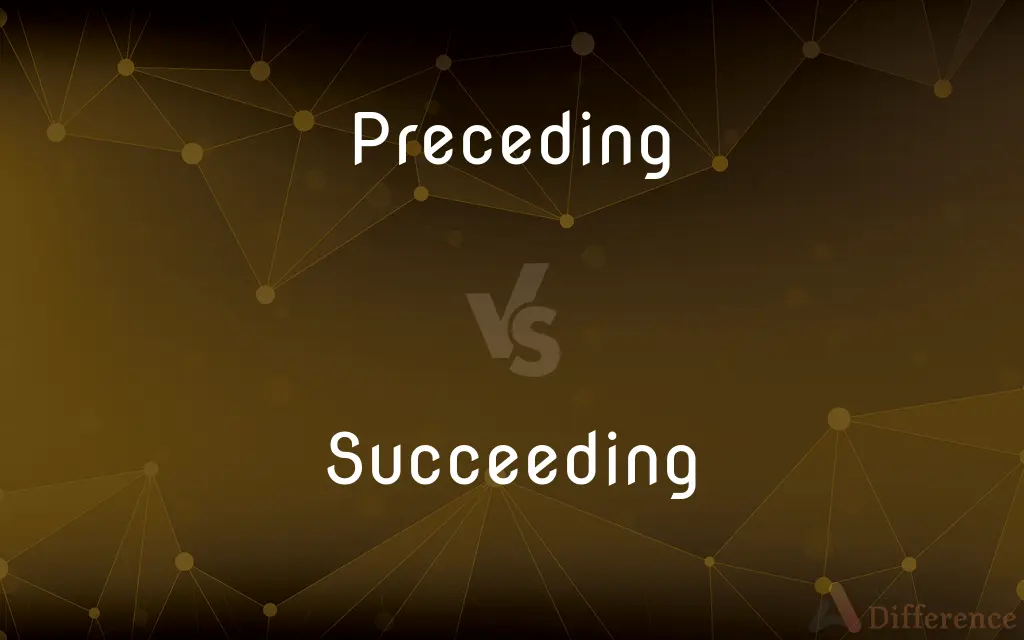Preceding vs. Succeeding — What's the Difference?
By Tayyaba Rehman — Updated on October 27, 2023
Preceding refers to coming before something, while succeeding means coming after. Both are crucial for understanding sequences and causality.

Difference Between Preceding and Succeeding
Table of Contents
ADVERTISEMENT
Key Differences
Preceding denotes something that comes before another in time, order, or place. Succeeding, on the contrary, implies something that follows or comes after. While the preceding sets the context or background, the succeeding often reveals outcomes or continuations.
In a timeline, preceding refers to events or moments that happened earlier, creating a foundation for what follows. Succeeding pertains to events or instances that occur later, often as a result of or in response to preceding elements. Both are crucial for understanding sequences and causality.
Preceding is akin to an introduction or a prelude, setting the stage. Succeeding, meanwhile, is like a sequel or continuation, providing further development or closure. In a story, the preceding chapters introduce characters, while the succeeding chapters unfold their journey.
When organizing information, preceding details often lay the groundwork, providing necessary background or framework. Succeeding details build upon this foundation, expanding, explaining, or concluding the presented information. The interplay of both ensures comprehensive understanding.
In discussions of ancestry, preceding refers to ancestors or forebears, those who came before. Succeeding refers to descendants or progeny, those who come after. The connection between the two spans across generations, linking past, present, and future.
ADVERTISEMENT
Comparison Chart
Temporal Position
Comes before in time.
Comes after in time.
Sequence
Refers to elements that are earlier in order.
Refers to elements that are later in order.
Function in Context
Often sets context or background.
Often reveals outcomes or continuation.
Relation to Events
Related to events or moments that happened earlier.
Related to events or instances that occur later.
Narrative Role
Introduces characters or sets the stage in a story.
Unfolds the journey or provides closure in a story.
Compare with Definitions
Preceding
Coming before in time, order, or position.
The preceding year was marked by significant events.
Succeeding
Subsequent or later in time.
The succeeding chapter revealed the mystery.
Preceding
Antecedent or foregoing.
The preceding generation witnessed many changes.
Succeeding
Continuing or carrying on from something.
The succeeding discussion focused on solutions.
Preceding
Existing or occurring before.
The preceding evidence was crucial to the case.
Succeeding
Coming after or following.
In the succeeding months, the situation improved.
Preceding
Leading up to or introducing something.
The preceding remarks set the tone for the speech.
Succeeding
Coming next or after something.
The succeeding generation embraced new technologies.
Preceding
Existing or coming before another or others
In preceding years.
On a preceding page.
Succeeding
Following in sequence or as a result.
Succeeding events proved the theory correct.
Preceding
Existing or coming immediately before another or others
The preceding year.
The preceding page.
Succeeding
To come next in time or order
She fell sick, and what succeeded was an outpouring of concern from her fans.
Preceding
Occurring before or in front of something else, in time, place, rank or sequence.
On the preceding Monday Shobana had gone on vacation.
Succeeding
To replace another in office or position
The prince succeeded to the throne.
Preceding
Present participle of precede
Succeeding
To accomplish something desired or intended
"Success is counted sweetest / By those who ne'er succeed" (Emily Dickinson).
Preceding
Going before; - opposed to following.
Succeeding
(Obsolete) To pass to a person by way of inheritance.
Preceding
In the direction toward which stars appear to move. See Following, 2.
Succeeding
To come after (something) in time or order; follow
Winter succeeds autumn.
Preceding
Existing or coming before
Succeeding
To come after and take the place of
The heir succeeded the king.
Preceding
Preceding in time or order
Succeeding
Following, next in order.
Preceding
Of a person who has held and relinquished a position or office;
A retiring member of the board
Succeeding
Present participle of succeed
Preceding
Previous or prior to something.
In the preceding chapter, the plot began to unfold.
Succeeding
Success
Succeeding
The act of one who, or that which, succeeds; also, that which succeeds, or follows after; consequence.
Succeeding
Coming after or following
Succeeding
(of elected officers) elected but not yet serving;
Our next president
Common Curiosities
Can succeeding refer to future events?
Yes, it often pertains to events or instances that occur later.
Is preceding always about time?
Not always; it can also refer to order or position.
Can preceding and succeeding be used in a timeline?
Yes, they are often used to describe positions in a timeline.
What does succeeding mean?
Succeeding means coming after or following something.
Can preceding refer to ancestors?
Yes, it can refer to ancestors or forebears.
How are preceding and succeeding used in narratives?
Preceding sets the stage, while succeeding unfolds the journey or provides closure.
How do preceding events affect succeeding ones?
Preceding events often set the context or cause for succeeding events.
What does preceding mean?
Preceding refers to coming before something in time, order, or position.
Can preceding be used for events?
Yes, preceding can describe events that happened earlier.
Does succeeding relate to descendants?
Yes, it often relates to descendants or progeny.
Can a chapter be both preceding and succeeding?
In a sequence, a chapter can be preceding to one and succeeding to another.
Does succeeding imply a direct sequence?
Generally, yes. It implies following in sequence or as a result.
Are preceding and succeeding only used in formal contexts?
They can be used in both formal and informal contexts.
Can preceding and succeeding be used interchangeably?
No, they have opposite meanings and are not interchangeable.
Is understanding preceding and succeeding important in analysis?
Yes, understanding their relationship is crucial for analyzing sequences and causality.
Share Your Discovery

Previous Comparison
Gap vs. Lap
Next Comparison
Affirm vs. AvowAuthor Spotlight
Written by
Tayyaba RehmanTayyaba Rehman is a distinguished writer, currently serving as a primary contributor to askdifference.com. As a researcher in semantics and etymology, Tayyaba's passion for the complexity of languages and their distinctions has found a perfect home on the platform. Tayyaba delves into the intricacies of language, distinguishing between commonly confused words and phrases, thereby providing clarity for readers worldwide.














































